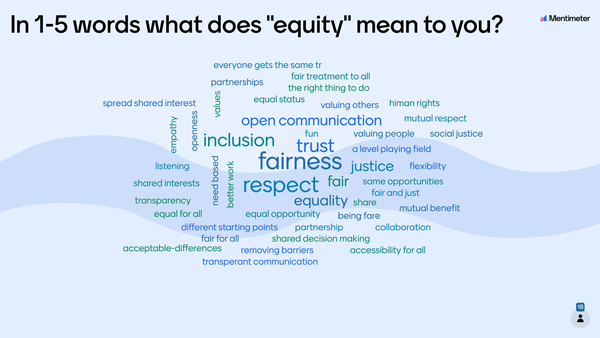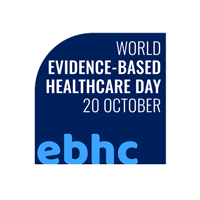Equity in Global Health Partnerships
International collaborations have become the standard model for global health research, with North-South global health partnerships in particular being promoted as a mechanism for strengthening health systems, advancing health equity and achieving the Sustainable Development Goals. While such partnerships are important for generating new knowledge, systems and solutions that will help address global health inequities, partnerships are situated in complex social, political and economic relationships, involving partners with different needs and interests that can often reproduce unequal power relations.
For this reason, equity is also recognized as a core value guiding best practice for global health partnerships, but what does this look like in practice? How can equitable partnerships be constructed, implemented and evaluated?
In 2022, the World EBHC Day Steering Committee held a webinar on Equity in Global Health Partnerships. Moderated by Sharmi Surianarain, Chief Impact Officer for Harambee Youth Employment Accelerator in South Africa, a panel of experts from the global evidence community discussed the complexity of global health partnerships and the relationships between individuals and organizations, each with their particular positions, context, needs, resources, and agendas.
In their discussion, panellists considered:
- What characterises an equitable partnership?
- Reflecting on panellists’ experiences: What are the challenges? What has worked well? What are the opportunities?
- How can we do better? As individuals and as organisations
The panel included Dr Loai Albarqouni, Institute for Evidence-Based Healthcare, Pilar Pinilla-Dominguez, NICE International, Dr Tamara Kredo, Cochrane South Africa, and Dr Nasreen Jessani, Centre for Evidence-Based Healthcare (see below for bios).

Figure: Participant word cloud activity
In this blog we provide some of the key takeaways from the webinar.
Begin with shared values and purpose
In terms of setting up a partnership for success in striving for equity, the panel discussed the importance of forming a partnership around a shared vision and purpose, which fosters trust (generated from shared values) and provides a firm foundation to build on.
As Nasreen suggested, “Ensuring alignment of values, principles and purpose is important because there are many times in the lifecycle of a partnership that situations will challenge the various partners- like conflicts of interest, resource considerations, new partners, different priorities, etc. However, knowing at the heart of it all that you have the same ultimate purpose and will approach those situations with the same values goes a long way in enhancing the resilience of a partnership.”
Partners need to co-design the partnership from the beginning, including defining the purpose of the partnership– doing so helps paint a clear picture for everyone involved of what benefits the collaboration will provide, the different contributions that each partner can make, and the supports they need to participate as equals.
Trust and ‘human’ relationships
At their core, partnerships are built on interpersonal relationships that are based on mutual trust. The panel highlighted the relational aspects of equity, such as a sense of belonging, open communication and empathy, reiterating that partnerships are fundamentally relationships between people. Panellists provided numerous candid examples of times when they had felt inadequate, unseen, and unheard during partnership meetings/ interactions.
Tamara reflected that if she experienced this when she was in a position of privilege and power, that there was a fundamental need to continually interrogate power dynamics, examining how different people feel in the partnership, in particular with partners who have less privilege or power. “When I leave a meeting or interaction and I am feeling inadequate, or I notice that someone else is not speaking up, I reflect on the possible power dynamics at play, and how to address them.”
As one participant commented: “for me, this speaks to how we value others in a partnership, which needs to be the very starting point - outcomes may not be totally equitable, no matter how hard we try, but listening to and respecting partners is fundamental. What will make a truly successful (equitable) partnership is the work we put in at the beginning to gain a real understanding of the humans we are working and interacting with.”
People are the heart of what makes a great partnership and what drives equity. When we spend time listening and understanding perspectives, culture and values, we create more sustainable, equitable partnerships.
Plan, invest time
Relationship building, however, takes time. The panel discussed the need for investing in relationship building, highlighting the importance of making time to prioritize relationships at least as much as the project, the importance of self-awareness, humility and learning from peers.
This includes taking the time and having the tools to work through conflict, to have challenging conversations, to stay present and involved in an active relationship, to give and receive feedback, and to understand individual power and privilege in the context of the partnership dynamics of race, power and privilege.
As Nasreen stated, “we cannot always ensure inclusion but can plan for it and champion it and call out inequity. Plan for equity by discussing and agreeing on: How do we champion equity? How do we call out inequity? How do we resolve disputes?”.
Pilar also emphasised the need to take the time to ensure that you are not making decisions *for* others, but *with others*, including specific examples for coordinating multi-stakeholder partnerships, for example citizen-council- public involvement and patient feedback to design programmes.
Language is important
The importance of language was explored in different contexts. Sharmi spoke about the inadvertent, but undervaluing use of ‘beneficiaries’ and ‘grantees’ by funders with a call out to change the language to ‘partners’, to better reflect the role that project partners play.
In response to participant questions about the different meanings of ‘just’, ‘justice’ and ‘equity’ in different cultural settings, the panel touched on the importance of understanding the use and meaning of different terms in different cultural settings, as these associations can have real effects on how research partnerships are designed and implemented.
Panellists agreed that words matter, they have power, and that language not only reflects cultural and social norms but shapes them.
Understanding cultural differences
Leading on from this was the necessity to understand and respect different cultures within a partnership. The panel discussed North-South partnerships, where Northern partners often have an individualistic rather than a collectivistic approach and where certain behaviours, such as being confrontational and disrespecting a colleague in public, can have negative outcomes. Partners need to make the effort to learn and understand cultural differences in terms of language (terms, definitions, expectations), behaviours and approach.
We need to be open to learn from others and widen our understanding of others and the background/context in which they are working.
Funding: sustainability, power & decision making
The topic of funding generated a lot of discussion with respect to equity and elicited a range of views. While panellists pointed out that funders are not a homogenous group and have different approaches, policies, and constituencies to whom they are accountable, they argued that funders have an ethical responsibility to ensure equity is achieved in the projects they fund.
Loai spoke about how many funding schemes incentivise the rapid development of short-term project-based partnerships, however this type of funding often does not cover all costs meaning under-resourced LMIC partners often face sustainability challenges. He suggested that funders can drive equity by demanding inclusive labour practices, contractual agreements, joint research agenda setting, the inclusion of local communities from the onset of the research and ensuring sufficient resources are allocated to aspects of research and collaborations that could promote it, such as funding capacity building and paying for indirect costs.
Several panellists described how feelings of mistrust and inequity were fuelled when the lead partner lacked transparency about how funds had been allocated between institutions. In particular, directing financial and project management through Northern institutions is perceived to influence power relations and equitability. Funders can directly fund Southern institutions, partner with Southern governments or work with regional funds.
Partners need to acknowledge and make power differences explicit. Funding and benefits that people get from projects (research) need to be made explicit and equity in decision making can help address power differences. Power also influences which types of evidence and knowledge are valued and consequently how research is designed and implemented and the type of outputs that are produced for which audiences. Equitable partnerships challenge hierarchies of evidence and knowledge and are inclusive of local and Indigenous knowledges.
Panellists agreed that funders have privilege, and can speak up for others, and use their privilege to do so.
Conclusion
Ultimately, all panellists spoke about how they are still learning, how each new partnership brings new challenges, and the only true way forward was to keep reflecting, challenge ourselves, use our privilege to stand up and call out inequity whenever possible and to celebrate small wins.
Or in Tamara’s words: “being part of the learning [evidence] community, pushing to improve fairness, justice, trust in global health partnerships - that is my hopeful view.”
Note: Unfortunately due to technical difficulties the webinar was unable to be recorded.
Panellists
Loai Albarqouni is an Assistant Professor and NHMRC Emerging Leader Fellow at the Institute for Evidence-Based Healthcare at Bond University and a medical doctor from Palestine.
Pilar Pinilla-Dominguez is an Associate Director at NICE International, responsible for the strategic objectives and direction of the NICE International services.
Tamara Kredo is the Deputy Director and Chief Specialist Scientist for Cochrane South Africa at the South African Medical Research Council and a medical doctor and specialist in clinical pharmacology.
Nasreen Jessani is a senior researcher at the Centre for Evidence Based Health Care, South Africa, and is responsible for capacity strengthening in evidence-informed decision-making and knowledge translation.
Authors
Bianca Pilla1, Elaine Harrow2, Dr Nasreen Jessani3, Heather McCulloch1, Dr Anna Mae Scott4, Emma Thompson5, Deborah Lee6, Dr Vivian Welch7, Prof Zoe Jordan1
1. JBI
2. Guidelines International Network
3. Centre for Evidence Based Healthcare
4. Institute for Evidence Based Health Care
5. Cochrane
6. National Institute for Health and Care Excellence
7. Campbell Collaboration
Disclaimer
The authors of this blog are from the World EBHC Day Steering Committee

The World EBHC Day Steering Committee provides strategic direction and oversee all other committees and working groups to further the goals of World Evidence Based Healthcare Day as a global initiative that raises awareness of the need for better evidence to inform healthcare.